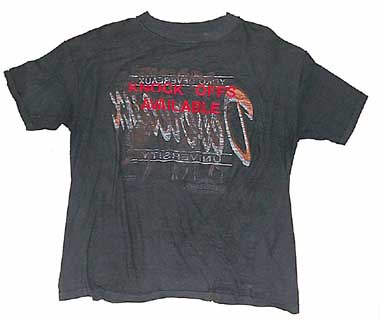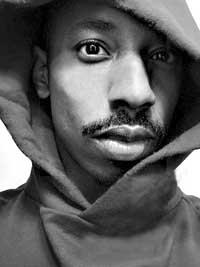|

Lucire: Where are you finding that you are
having the most success in selling your collections?
Andy Salzer: Surprisingly, with a name like Yoko Devereaux,
itís Tokyo. Tokyo has been our number-one market for sure. We are
also making incremental headway in the European market. The reality
is that there are only a certain number of stores in which we would
like to place our products within the United States. (I learned
this after being in business for a year and a half because when
you are evolving, you donít necessarily have the brand awareness,
the history or the reputation to have any clout with buyers.) At
the same time, there are only a small number of boutiques where
the product mix is an equal balance of street-wear and high fashion
in all of the United States. I would say there are only 20 of them;
and of that 20, only 10 are even good. The thing to remember is
this: when you are starting a new brand, the placement of your brand
is everything. Itís not a matter of being snotty. If you are going
to put your heart and soul into a project, then you have to put
it where you want to put it and donít accept anything less.
It takes longer [to achieve success] and you do have to be more
patient but it will happen.
Lucire: You have mentioned earlier on that you were
involved in another retail company. What lessons did you learn from
that partnership that you have carried over into Yoko Devereaux?
Andy Salzer: The biggest lesson I learned was that rather
than approaching merchandising in an over-analytical manner (what
pieces you think are going to sell, what you think is going to work
and taking the joy out of it by depending too much on demographic
research and polls), itís better to enter the project with a mindset
that you are doing something you really want to do, thus allowing
it to grow and morph into a viable business on its own. The stores
I operated in Seattle were based on labour-intensive hard research
and looking at markets with focus groups and all of that. This was
important for developing a business plan, but for the long haul,
it just wasnít much fun or very creative. It was financially
successful yes, but personally, no. Yoko Devereaux was a project
that I really wanted to do. It is a project that is an extension
of me and my beliefs.
Lucire: So while you do want to be successful, you
are not expecting this to be a multi-multi million dollar business
two years from now?
Andy Salzer: My goal with this project is to live off of
it and enjoy what I am doing. Where that goes and what it becomes
is totally up in the air. My main focus has been making sure that
I am personally growing, the business is growing and that I donít
have to depend on other jobs that would distract me from giving
this my all.
Lucire: We touched on the Tom FordĖGucci situation
earlier. Do you see their failure to reach an agreement as a precursor
of changes to come throughout the rest of the industry?
Andy Salzer: It depends on who ultimately makes the final
decision. Fashion and design are creative industries, and mixing
them with business, a lot of times, can be like mixing oil and water.
Tom Ford and the time he spent at Gucci was at the very beginning
of the economy rising up and becoming crazy good for everyone involved.
The timing couldnít have been better. His Studio 54 take on fashion
made Gucci sexy. He was selling Studio 54 sexy and thatís what Gucci
means to me. It was the party I could never get into. Why? Because
one, I wasnít around then but mostly he was selling exclusivity
and the right to be one of the beautiful people. His early and continued
success gave him a lot of freedom to call the shots because tons
of money was coming back into the business. He was a major personality
within the business and a force to be reckoned with on all fronts.
The cult of personality played a major role here, and still does
throughout the industry. From my reading of the situation, he was
seeking to maintain that 100 per cent creative control he has always
had in a financial and creative climate. That has changed;
and the parent company was like, ĎNo, weíre not going to allow that.í
What does this mean? No one knows just yet, but the message I got
from that was itís not enough to be creative: one has to be accountable
financially for what decisions they make creatively. The owners
of Gucci could decide to replace him with someone whoís less charismatic,
thus placing more emphasis on the product. Or, they could replicate
the same formulæ: a charismatic and talented designer who
defines the brand, much in the way Mr Ford did during
his lengthy tenure at Gucci. Either way, itís a new day at Gucci
and all the worldís watching to see how it all pans out.
I understand both sides of the situation because,
as an independent designer, if I am not a strong business person,
then I wonít be in business long; and it is that much harder to
be taken seriously later on when I may need to turn to someone else
to help me grow the business. As it stands now, I still have a general
grasp on building and evolving the Yoko Devereaux line. I donít
feel that I have hit the wall, whether it is financial or
personal. Am I in over my head yet? No. Talk to me a year from now,
you may get a different answer. There will be a time that if I want
to continue doing this, I will need additional financial backing.
And I donít know what will happen in a situation like that. Would
I willing sell the company? Give up control? I donít know.
Lucire: You recently announced that Thomas is leaving
the company to go back to school in Boston. It must have thrown
you into a transition that you least expected.
Andy Salzer: Itís definitely a transition. Thomas and
I started the project, and weíve worked on every aspect of it together
from the beginning. However, Thomas decided he wanted to go back
to school, which is great. I totally support that. What that means
for the company? We have a new menswear designer and design director,
Troy Smith, who is really quite talented. Heís been doing this for
years, skilled with working with leather and other skins; heís had
his own business, and is a great asset to us. The biggest challenge
in a transition like this is making sure that the message we are
sending as a brand and through the clothing isnít turned upside
down. A lot of times when you change designers, you unintentionally
invert the whole project. Troy is someone whoís worked in design
production for a long time, and his experience will allow us to
step up to the next level on a lot of the details. He gets the brand,
thus this isnít something that is too far out of reach for him.
This is a chance for us to grow. If [Thomasís leaving] had happened
after the first season, we would be having an entirely different
conversation. I donít know that we would be talking right now. But
we have built the companyís foundation up to a good point where
Thomasís departure and Troyís arrival will cause nary a ripple.
Lucire: What are some of the other changes coming
on the horizons for you and the company?
Andy Salzer: We are working on introducing a higher-end Yoko
Devereaux collection, consisting of about seven to ten pieces. The
plan is to design a higher-price product, keeping it exclusive and
small until we have worked out all the kinks and are ready to break
it out to compete with similar designs on the market.
Lucire: What should we expect for the fall 2004 collection
from you guys?
Andy Salzer: I think this next season will be our entrance
point into some specialty department stores. We are now prepared
to enter the larger menswear arena with greater confidence
to include Barneys, Saks and other larger stores. The line will
continue to be very fashion-forward with a focus on fit and
wearability. With our using better fabrics and attempting to stretch
our wings a bit design-wise, it will have an old-school feel with
a dose of our sense of humour. In the early years, we worked hard
at internally defining the brand among ourselves first
before taking the message out to community. Yoko Devereaux is not
just about wearing T-shirts and jeans. Nor is it about just suits.
Itís positioned somewhere in between modern sportswear and what
your father wore in his time.
Lucire: How are you, yourself, dealing with all the
changes?
Andy Salzer: I love it and am very excited about the future
of Yoko Devereaux. Iíve always loved change, thatís the thing. Change
is really healthy. Thomasís leaving is very upsetting because I
just adore him, but for like everything else that is going on, nothing
seems bigger than it should. It all seems to be happening for the
right reasons.
Lucire: I am going to put you on the spot. As someone
in the eye of the storm, what is the future of menswear in America?
Andy Salzer: I hate these questions because I canít predict
the future. I have no idea. I do see where men are beginning
to be more dressed up again. Was it Simon Doonan who said that he
was over the dirt-bag look? I think itís a genius statement only
because it has been so casual for so long. Thereís a comfort factor
thatís inherent with casual dress that I actually love and formal
can be too uptight and elitist, which I canít stand. With men having
learned how to walk the tightrope between the two extremes, I think
itís going to be a little bit nicer to see guys more cleaned up.
Men may not abandon their T-shirts and jeans but they will bring
in more formal elements into their wardrobe. The people I know and
respect are not wearing T-shirts and jeans that much anymore. They
are wearing pants that look like jeans. They are definitely
wearing more blazers and dress shirts. They are trending up into
a casual formality that bodes well for everyone.
Lucire: Do you foresee a time when you may leave
the company? Or is it going to be disbanded if you are not around?
Andy Salzer: I have no idea. Right now, I am really happy
with what I am doing and will continue working in the company as
long as I am happy with my performance. Letís put it that way, I
canít imagine not being here.
Phillip D. Johnson is featuresí editor of
Lucire.
|
‘The reality of the market
right now is that itís all about separates, the rise of the thrift
store culture and mixing and matching pieces. The days of head-to-toe
Dior or Chanel are long gone’

ABOVE LEFT: Taavo
for Yoko Devereaux. ABOVE: Troy
Moxham for Yoko Deveraux. BELOW:
Troy Smith, the new design director of Yoko Devereaux.

|